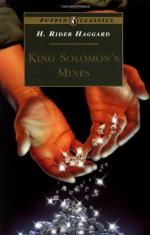“It was even so, Macumazahn.”
“In like manner, Ignosi, do our hearts turn to our land and to our own place.”
Then came a silence. When Ignosi broke it, it was in a different voice.
“I do perceive that now as ever thy words are wise and full of reason, Macumazahn; that which flies in the air loves not to run along the ground; the white man loves not to live on the level of the black or to house among his kraals. Well, ye must go, and leave my heart sore, because ye will be as dead to me, since from where ye are no tidings can come to me.
“But listen, and let all your brothers know my words. No other white man shall cross the mountains, even if any man live to come so far. I will see no traders with their guns and gin. My people shall fight with the spear, and drink water, like their forefathers before them. I will have no praying-men to put a fear of death into men’s hearts, to stir them up against the law of the king, and make a path for the white folk who follow to run on. If a white man comes to my gates I will send him back; if a hundred come I will push them back; if armies come, I will make war on them with all my strength, and they shall not prevail against me. None shall ever seek for the shining stones: no, not an army, for if they come I will send a regiment and fill up the pit, and break down the white columns in the caves and choke them with rocks, so that none can reach even to that door of which ye speak, and whereof the way to move it is lost. But for you three, Incubu, Macumazahn, and Bougwan, the path is always open; for, behold, ye are dearer to me than aught that breathes.
“And ye would go. Infadoos, my uncle, and my Induna, shall take you by the hand and guide you with a regiment. There is, as I have learned, another way across the mountains that he shall show you. Farewell, my brothers, brave white men. See me no more, for I have no heart to bear it. Behold! I make a decree, and it shall be published from the mountains to the mountains; your names, Incubu, Macumazahn, and Bougwan, shall be “hlonipa” even as the names of dead kings, and he who speaks them shall die.[*] So shall your memory be preserved in the land for ever.
[*] This extraordinary and negative way of showing
intense respect is
by no means unknown among
African people, and the result is that
if, as is usual, the name
in question has a significance, the
meaning must be expressed
by an idiom or other word. In this way a
memory is preserved for generations,
or until the new word utterly
supplants the old.
“Go now, ere my eyes rain tears like a woman’s. At times as ye look back down the path of life, or when ye are old and gather yourselves together to crouch before the fire, because for you the sun has no more heat, ye will think of how we stood shoulder to shoulder, in that great battle which thy wise words planned, Macumazahn; of how thou wast the point of the horn that galled Twala’s flank, Bougwan; whilst thou stood in the ring of the Greys, Incubu, and men went down before thine axe like corn before a sickle; ay, and of how thou didst break that wild bull Twala’s strength, and bring his pride to dust. Fare ye well for ever, Incubu, Macumazahn, and Bougwan, my lords and my friends.”




